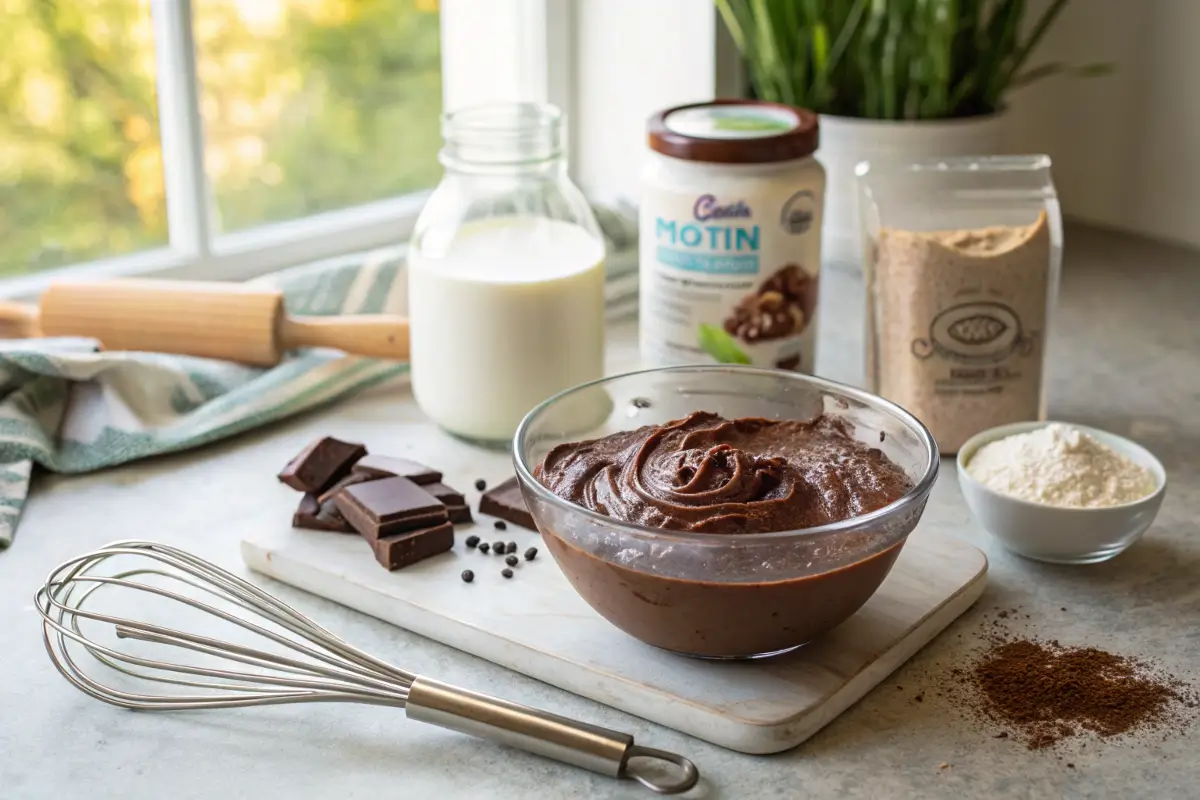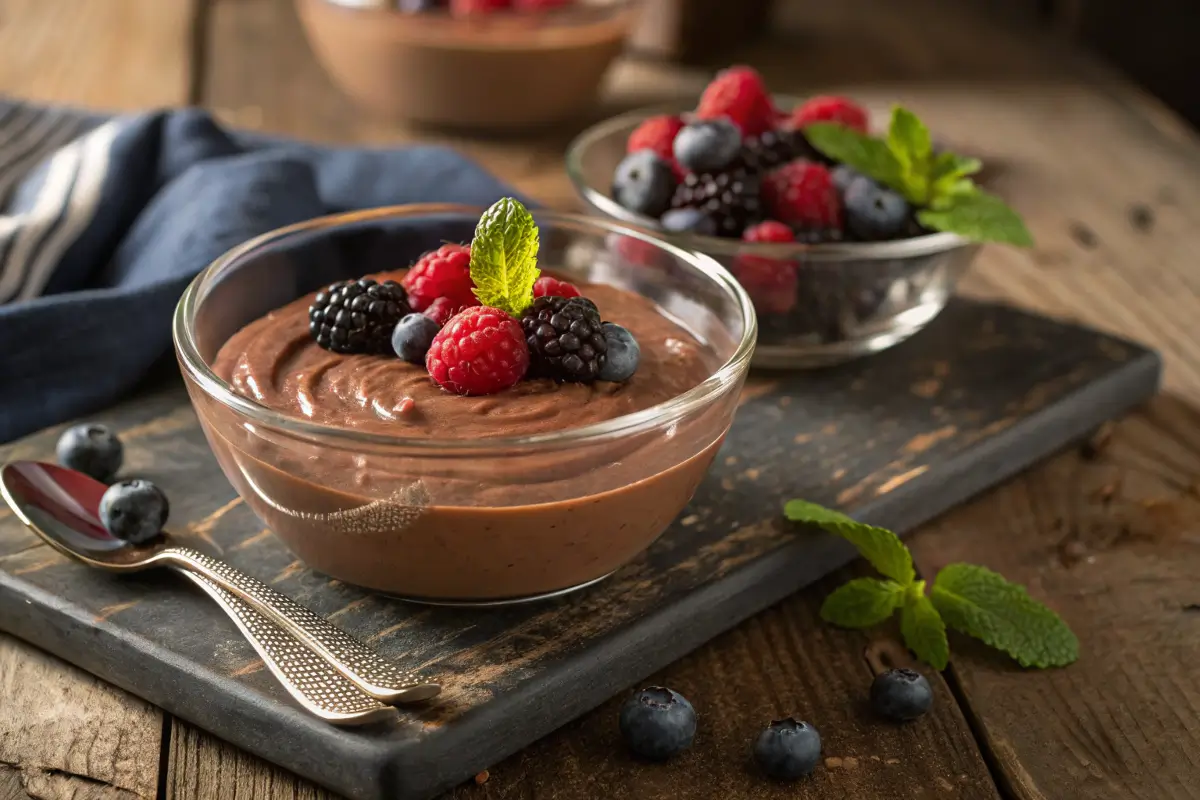Getting a good night’s sleep is vital for overall health, but what if your bedtime snack could also work wonders for your muscles and metabolism? Enter protein pudding—a creamy, delicious treat that’s not only satisfying but also packed with slow-digesting proteins. Many fitness enthusiasts and health-conscious individuals swear by it, claiming benefits like improved recovery, muscle growth, and even better sleep. But is it really the game-changer it’s touted to be? This article dives deep into the science, benefits, and practical tips surrounding protein pudding before bed. Let’s uncover whether it’s worth adding to your nightly routine.
Benefits of Eating Protein Pudding Before Bed
How Protein Aids Muscle Recovery During Sleep
During sleep, your body goes into repair mode, fixing tiny tears in muscle fibers caused by daily activities or workouts. Protein plays a key role in this repair process, as it provides the amino acids needed to rebuild and strengthen muscles. Consuming protein before bed ensures your body has a steady supply of nutrients during these crucial hours.
But why does timing matter? Unlike daytime meals, which are digested quickly, bedtime protein—especially from a source like casein protein—releases amino acids slowly, fueling recovery throughout the night. This prolonged digestion process supports consistent muscle repair and growth.
Casein vs. Whey: The Best Protein for Nighttime
Not all proteins are created equal when it comes to bedtime snacks. Casein protein, found in dairy products, is the go-to choice for nighttime nutrition because it digests at a slower rate than whey. This means it provides a steady stream of nutrients while you sleep, keeping your muscles fed for longer periods.
On the other hand, whey protein is fast-absorbing, making it ideal for post-workout recovery but less effective for overnight use. By choosing a casein-rich snack like protein pudding, you’re giving your body the nutrients it needs, exactly when it needs them.
Slow-Digesting Proteins and Sustained Nutrient Release
Protein pudding is an excellent source of slow-digesting proteins, making it a perfect choice for nighttime. Unlike quick-energy snacks or sugary treats that cause blood sugar spikes, protein pudding delivers a steady release of nutrients. This prevents hunger pangs, helps regulate blood sugar, and supports muscle repair while you sleep.
Beyond muscle recovery, protein consumption before bed may even enhance your metabolism. Studies suggest that nighttime protein can help maintain lean muscle mass, which in turn boosts your resting metabolic rate. So, you’re not just sleeping—you’re actively supporting your health goals.
Scientific Evidence Supporting Protein Before Bed
Studies on Muscle Growth and Protein Timing
Numerous studies have investigated the impact of nighttime protein intake on muscle growth. Research highlights that consuming protein before bed can enhance muscle protein synthesis—a process where muscles repair and grow stronger. This effect is particularly pronounced when paired with a regular strength training regimen. For example, studies comparing casein protein to a placebo revealed improved recovery and increased muscle mass in individuals who consumed casein before sleeping.
Protein timing matters. During the night, the body relies on a steady nutrient supply to fuel its recovery processes. A slow-digesting protein like casein, commonly found in dairy-based snacks like protein pudding, sustains this repair process longer than fast-absorbing proteins.
Impact on Sleep Quality and Hormone Regulation
Another compelling benefit of eating protein pudding before bed is its potential to improve sleep quality. Protein-rich foods can stimulate the production of serotonin and melatonin—hormones essential for regulating sleep cycles. Additionally, slow-digesting proteins help stabilize blood sugar levels overnight, reducing the likelihood of waking up hungry or fatigued.
Protein and Its Role in Metabolism Overnight
Did you know that consuming protein before bed might even boost your metabolism? Research suggests that nighttime protein increases resting metabolic rates by preserving lean muscle mass. This makes your body more efficient at burning calories, even at rest. The concept of “sleeping and slimming” might not be a myth after all!
What Is Protein Pudding, and Why Choose It?
What Makes Protein Pudding Different From Other Snacks?
Protein pudding is a delicious, creamy treat designed to deliver a substantial dose of protein without unnecessary sugars or fats. Unlike traditional desserts, which may spike your blood sugar, protein pudding provides sustained energy and nutritional value, making it an ideal nighttime snack.
What sets protein pudding apart is its versatility. It can be customized with different flavors and ingredients, such as chocolate, vanilla, or even fruits and nuts. Plus, it’s easy to prepare and convenient to consume, whether you buy a ready-made version or whip one up at home.

Nutritional Benefits of Protein Pudding
This tasty treat isn’t just about flavor—it’s also packed with health benefits. Protein pudding is typically rich in casein protein, which digests slowly and provides a steady release of amino acids throughout the night. It’s also an excellent way to meet your daily protein intake goals without feeling like you’re eating a “diet” food.
Adding protein pudding to your bedtime routine supports muscle recovery, improves satiety, and might even enhance your metabolic health. It’s also a better alternative to sugary snacks that can disrupt your sleep patterns.
Top Ingredients to Look For in a Protein Pudding
When shopping or preparing your own protein pudding, prioritize ingredients that maximize nutritional value. Look for options with:
- Casein protein as the primary ingredient.
- Natural sweeteners like stevia or honey instead of refined sugars.
- Added nutrients like fiber or probiotics for gut health.
Timing and Portioning: How to Incorporate Protein Pudding Before Bed
When Is the Optimal Time to Eat Protein Pudding?
Timing plays a crucial role when considering Should you eat protein pudding before bed? Ideally, you should enjoy protein pudding about 30 minutes to an hour before bedtime. This window gives your body enough time to start digesting the pudding, ensuring a steady release of amino acids throughout the night.
Avoid eating it too late, as a full stomach might disrupt your sleep. Pairing protein pudding with a calming evening routine—like reading or meditation—can help signal your body it’s time to wind down.
How Much Protein Is Ideal Before Bed?
When it comes to portion sizes, moderation is key. Aim for a serving size that contains 20–40 grams of slow-digesting protein. This amount has been shown to be optimal for muscle recovery and overnight metabolism.
Consuming too much protein, however, can leave you feeling overly full, potentially impacting your sleep quality. Keep in mind your daily protein intake to avoid overdoing it.

Balancing Protein Pudding With Daily Calorie Goals
Even though protein pudding is nutritious, it’s still important to account for its calories within your daily dietary goals. If you’re working on muscle growth, the calories can serve as a beneficial addition. For weight maintenance, opt for lighter versions made with low-fat milk or unsweetened ingredients.
Alternatives to Protein Pudding for Nighttime Snacking
Other High-Protein Snacks to Consider
If protein pudding isn’t your thing, there are plenty of alternatives that still provide the benefits of slow-digesting protein. For instance, Greek yogurt, cottage cheese, or a glass of casein protein shake can also fuel muscle recovery while you sleep. These snacks are convenient, versatile, and often easier to prepare than a full dessert.
Comparing Protein Bars, Shakes, and Pudding
Each protein snack has its own advantages. Portable and often pre-portioned, protein bars are convenient but might contain added sugars or artificial ingredients. On the other hand, protein shakes offer a quick fix, though they can lack the satisfying texture of a solid snack. For those seeking indulgence without compromising nutrition, protein pudding delivers the perfect balance.
Protein and Carb Pairing for Improved Recovery
For an extra boost, pair your nighttime protein with a small serving of carbs, like a banana or a handful of oats. Carbs help replenish glycogen stores and can enhance the transport of amino acids into your muscles. Plus, this combination can promote serotonin production, helping you relax and sleep better.
Are There Any Downsides to Eating Protein Pudding Before Bed?
Digestive Issues and Food Sensitivities
When considering should you eat protein pudding before bed, it’s essential to recognize potential drawbacks. Some individuals may experience digestive discomfort, particularly if they are lactose intolerant or sensitive to ingredients like casein or whey. These proteins, commonly found in many protein puddings, can cause bloating or indigestion for sensitive individuals.
To minimize this risk, try dairy-free or plant-based protein puddings made from pea protein or almond milk. These alternatives are gentler on the stomach while still offering slow-digesting benefits.
Overconsumption and Weight Gain Risks
Another key consideration when asking should you eat protein pudding before bed is portion control. Overindulging in protein pudding—especially versions high in added sugars or calories—can lead to unwanted weight gain. While it’s beneficial as a pre-sleep snack, consuming too much can disrupt your calorie balance.
Additionally, eating late at night might disturb some people’s digestion, causing discomfort or interrupted sleep. Monitor how your body responds and make adjustments as needed.
Who Should Avoid Protein Before Bed?
Not everyone requires a bedtime protein boost. If your diet already fulfills your protein needs, or if you’re not focused on muscle recovery, skipping this snack might be better. Always consult a healthcare provider to determine whether it fits your specific dietary goals.
Frequently Asked Questions (FAQs)
Does protein pudding help with weight loss?
Yes, but only if it fits into your overall calorie and macronutrient goals. Protein pudding can promote satiety, reducing late-night cravings that lead to overeating. However, calorie-dense puddings may hinder weight loss if not portioned properly.
Can eating protein pudding before bed cause indigestion?
For some individuals, consuming protein pudding too close to bedtime can cause bloating or mild indigestion, especially if made with lactose-rich ingredients. Choosing a plant-based version or eating it earlier in the evening may help.
Is casein protein better for nighttime than whey?
Yes, casein protein is superior for nighttime because it digests more slowly than whey, providing a steady supply of amino acids during sleep. This makes it ideal for muscle recovery and preventing overnight muscle breakdown.
What are the best protein pudding brands to try?
There are many great brands offering nutritious and tasty protein puddings. Look for options with clean ingredients, low sugar content, and a good balance of protein and calories. Homemade recipes are also an excellent alternative for customization.
For a step-by-step recipe guide, check out our article on how to make protein pudding at home.
How to Choose the Best Protein Pudding for Bedtime
Key Factors to Consider When Choosing Protein Pudding
When deciding should you eat protein pudding before bed, selecting the right product is essential. Not all protein puddings are created equal, and some may be better suited for your dietary goals than others. Look for options that prioritize quality ingredients and align with your nutrition plan.
Start by checking the protein content. A good bedtime pudding should contain at least 15–20 grams of slow-digesting protein, such as casein. This ensures your muscles are supplied with amino acids throughout the night.
Next, focus on sugar levels. Many commercial puddings contain added sugars that can lead to unnecessary calorie consumption and energy spikes. Opt for products with natural sweeteners or low sugar content to avoid disrupting your sleep.
Comparing Store-Bought and Homemade Options
Store-bought protein puddings are convenient, but homemade versions offer greater control over ingredients and flavors. Preparing your own allows you to customize it with healthier options, such as almond milk, natural cocoa, or fresh fruit toppings.
For those pressed for time, ready-made puddings can still be a good choice—just ensure the label meets your nutritional needs.
Final Thoughts on Protein Pudding Before Bed
Should You Eat Protein Pudding Before Bed?
Incorporating protein pudding into your nighttime routine can be a smart choice, especially if you’re aiming for better muscle recovery, improved metabolism, or reduced cravings. Thanks to its slow-digesting protein content, it keeps your body fueled during sleep, enhancing overnight repair processes.
However, like any dietary habit, moderation is key. Make sure your pudding aligns with your overall nutritional needs and doesn’t exceed your daily calorie intake. Keep an eye on ingredients, especially if you’re sensitive to lactose or prefer clean eating.
Is Protein Pudding Right for You?
The answer depends on your goals. If you’re actively building muscle or managing your weight, protein pudding can provide significant benefits. But if you already meet your protein needs through meals, it may not be necessary.
Ultimately, should you eat protein pudding before bed? It’s worth a try if you’re looking for a nutritious, satisfying snack that supports your fitness and health goals. Remember to choose wisely and listen to your body’s needs.

